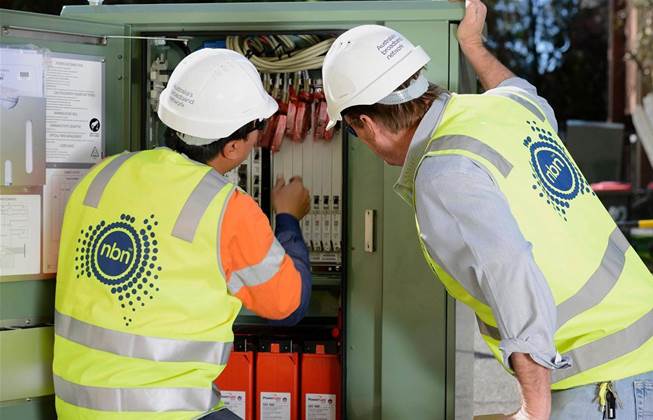NBN Co has finally revealed an official take-up figure for its fibre overbuild program, saying that 106,000 premises have upgraded from fibre-to-the-node (FTTN) or fibre-to-the-curb (FTTC).

The company had long deferred questions about take-up of what is officially known as the Fibre Connect program to its full-year results announcement.
That has made tracking the overbuild program - the most significant piece of work NBN Co is currently undertaking - difficult, though not impossible, to track.
As iTnews estimated at the end of last year, take-up was likely to be in the mid tens of thousands of premises, based on regulatory disclosures.
Still, the fact the company exceeded 100,000 only last week - more than a month after year-end - puts it behind its own stated targets for the program, which may have contributed to the consistent delays in reporting numbers.
iTnews revealed in February that NBN Co had been targeting 121,000 upgrades from FTTN to full fibre, and an additional 36,000 premises from FTTC to fibre, by June 30. That is, the target was 157,000 migrations.
NBN Co’s numbers today show that it managed to upgrade 89,626 premises from both the FTTN and FTTC footprints to full fibre by June 30 - missing the target by 67,374 premises or 42 percent.
For the figure to now be over 100,000, the rate of take-up is starting to increase.
But it will need to in order to meet its FY24 target of 245,000 additional premises upgraded.
The company said that over 2 million premises in the FTTN/C footprints can place an order for a 100Mbps service or more that would trigger an upgrade.
Almost 1.1 million premises are in the FTTN footprint, and about 950,000 currently connect via FTTC.
Thinking bigger
Responding to questions from iTnews, NBN Co CEO Stephen Rue said that the progress of the fibre upgrade program should be viewed with a longer-term lens, rather than on a year-to-year basis.
"You’ve got to think about this as capital over a decade," he said.
"As customers need the higher speeds, customers will move over time.
"So rather than look at this as a FY23 thing, you need to look at this over a longer period of time."
Rue indicated that the missed target was due to a combination of not as many retail service providers (RSPs) signing up to sell upgrades, and the time needed to ready RSPs' IT systems.
"In terms of this particular year, in order for the retailers to be able to enable their customers to move to the higher speeds, they’ve had to do quite a lot of work in the background in terms of IT systems," Rue said.
"They’ve also been waiting for significant footprint to be available so they can efficiently spend their marketing dollars. And as a result of that, not all the retailers have actually been in-market this year.
"Now, we’re expecting a significant uplift in both marketing spend and in retailers all being in-market with their systems in place to be efficiently able to move their customers from the copper-based technologies to fibre-based technologies.
"So we will see in coming weeks and months a ramp-up of activity and a ramp-up in orders, from the 3000 [per week] we see today to a number well in excess of that."
Chief customer officer Anna Perrin also said customer demand played a role in the uptake.
"We obviously have built the network ahead of time so that when customers demand higher speeds and higher data that the FTTP network is there for them to be able to order it," she said.
"We’re seeing a lot of interest and the lead indicators are trending well.
"At the beginning of this year we were around 1300 orders per week, but this has been steadily increasing and now stands [at] about 3000 orders a week.
"We are expecting the volume of orders to increase significantly in the rest of FY23 calendar year. It’s definitely clear that there is demand for fibre and for high-speed reliable broadband, therefore I think we’re very confident about the trajectory forward."
By the numbers
NBN Co reported total revenue for the year ended June 30 of $5.27 billion, up three percent year-on-year and within its expected range.
The company still reported a loss - $1.12 billion - but this was a 24% or $349 million improvement on last year.
Capital expenditure on IT was up $56 million year-on-year to $306 million, which NBN Co attributed to "increased software and system development investment ... in continuing support of operational simplicity initiatives and strategic objectives".
Over the past year, NBN Co also "repaid a further $875 million" to the government, "reducing the outstanding balance" of its loans to $5.5 billion.



.png&h=140&w=231&c=1&s=0) Tech in Gov 2024
Tech in Gov 2024
















